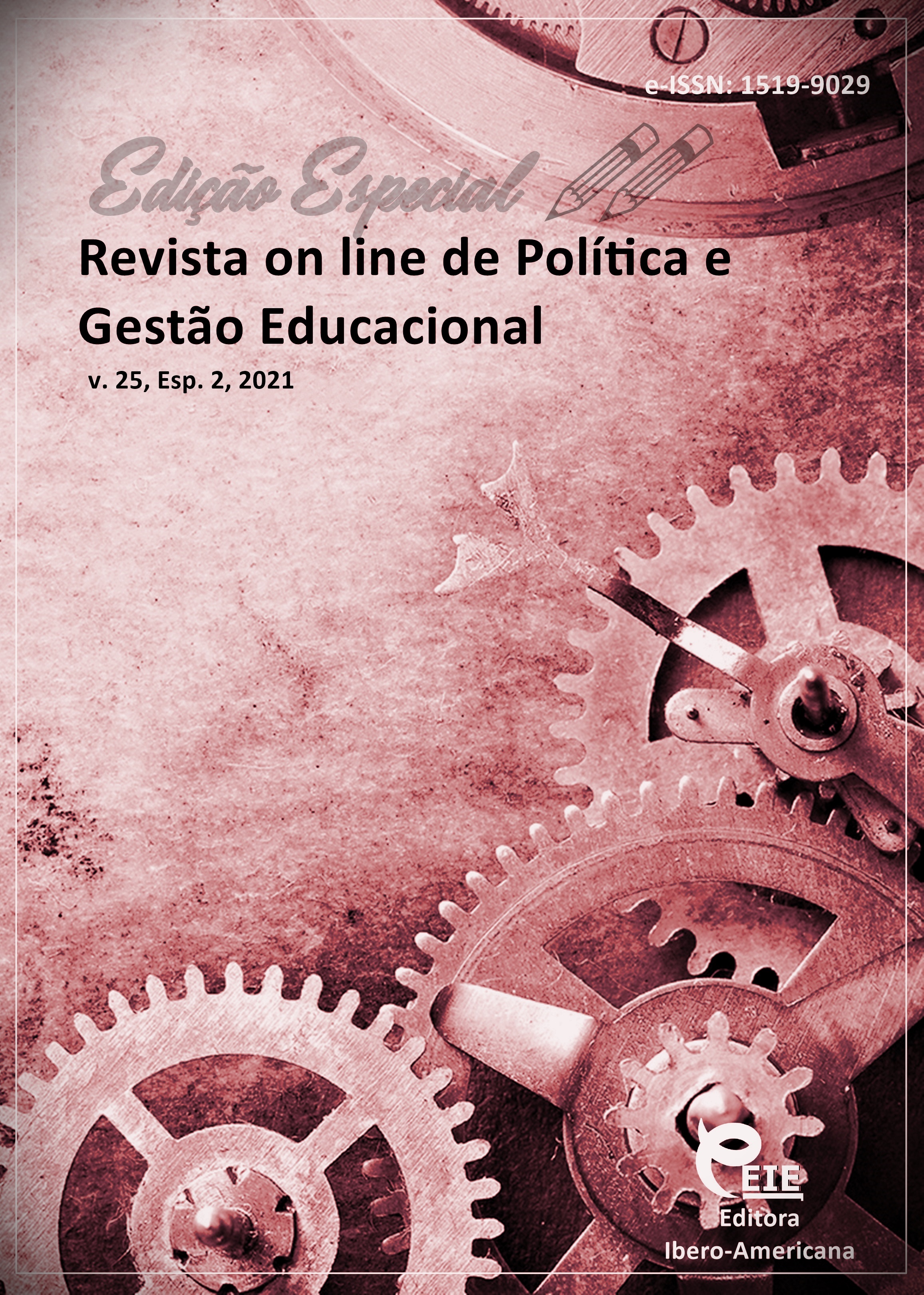Modelo de desenvolvimento de criatividade profissional de professor de línguas estrangeiras por meio da arteterapia nas condições de educação complementar
DOI:
https://doi.org/10.22633/rpge.v25iesp.2.15273Palavras-chave:
Educação adicional, Arteterapia, Desenvolvimento da criatividade, Língua estrangeira, ProfessorResumo
O artigo apresenta os resultados do desenvolvimento e da análise da eficácia do modelo para o desenvolvimento criativo profissional de um professor de línguas estrangeiras, utilizando a terapia da arte no contexto da educação adicional. O artigo tem como objetivo fornecer um estudo teórico e empírico da eficácia do modelo para o desenvolvimento da criatividade profissional de um professor de língua estrangeira através da arte-terapia no âmbito da educação complementar. Chama-se a atenção para o papel e a importância da criatividade na atividade do professor de língua estrangeira, para a importância da aprendizagem criativa no contexto da educação linguística. A metodologia de pesquisa e seu algoritmo são selecionados, incluindo a realização de um experimento psicológico e pedagógico complexo, realização de diagnósticos dos parâmetros declarados e análise estatística dos resultados com base no critério de Spearman rs antes e depois da implementação do modelo desenvolvido. O estudo da eficácia do modelo para o desenvolvimento criativo profissional de um professor de línguas estrangeiras usando a arte-terapia no âmbito da educação adicional foi realizado com base no Instituto de Línguas Estrangeiras da Universidade da Amizade dos Povos da Rússia (RUDN), na Centro de Educação Profissional Adicional. O grupo experimental e controle foi formado. Cada grupo era composto por 35 pessoas. A amostra é homogênea por idade e sexo. Os resultados do estudo permitem tirar uma conclusão sobre a eficácia do modelo de desenvolvimento desenvolvido e traçar o vetor de novas pesquisas de acordo com os problemas apontados.
Downloads
Referências
AMINOVA, D. K.; TSAKHAEVA, A.A. Effective preparation of the future psychologist as one of the elements of the security education system. International Journal of Medicine and Psychology, v. 1, n. 3, p. 40-47, 2018.
BAKANOVA, I. G.; ELIZAROVA, E. A. The impact of the results of the e-learning management in the university on the effectiveness of teaching. Review of Pedagogical Research, v. 1, n. 2, p. 5-12, 2019.
BORISOV, V. I. Influence of the food crisis for the revolution of the working mass of russia in the years of the first world war (August 1914 - February 1917). Historical Bulletin, v. 1, n. 2, p. 49-55, 2018.
BORISOVA, M. V. et al. Use of fitness directions elements on physical education classes and their psychomatic impact on students of the special medical group. Modern Scientist, n. 1, p. 6-9, 2018.
BUGREEVA, A. S. Questions of efficiency of using digital technologies in the system of higher vocational education. Modern Scientist, n. 6, p. 86-91, 2019.
EGAH, M. G. Creativity and Invention in Teaching and Learning of English Language in the Department of English Language College of Education. Journal of Teacher Perspective, v. 10, n. 1, Dec. 2015. ISSN 2006-0173.
FILIPPOVA, E. O. et al. The role of intellectual abilities at the stage of professional training selection. Modern Scientist, n. 5, p. 39-45, 2019.
GADZAOV, A. F.; DZERZHINSKAYA, M. R. Mathematical methods of analysis of the periodic components of economic processes. Modern Economy Success, n. 1, p. 14-18, 2018.
GADZHIEVA, U. B. Socialization of personality as a factor in the mental, intellectual and spiritual-moral development. International Journal of Medicine and Psychology, v. 1, n. 2, p. 17-20, 2018.
GNATYUK, S. N.; PEKERT, N. А. Education as a factor of sustainable development of agriculture. Russian Economic Bulletin, v. 1, n. 3, p. 18-27, 2018.
IVCEVIC, Z. Emotional intelligence and emotional creativity [Electronic resource]. 2015. Available: http://oxbow.sr.unh.edu/zivcevic. 10 Dec. 2020.
KOROTKOV, S. L. Interdisciplinary approach to the learning process. Modern Scientist, n. 5, p. 18-23, 2019.
KRYUCHKOVA, K. S. Modular training of future teachers with the use of information technologies in the conditions of virtual academic mobility. Modern Humanities Success, n. 4, p. 9-14, 2018.
KUZNETSOV, A. A. et al. Strategy and key elements of competitiveness. Modern Economy Success, n. 1, p. 25-29, 2018.
MAKAROVA, V. V. Professional activity of the bachelor of management in the context of social interaction competence. Review of Pedagogical Research, v. 1, n. 1, p. 19-25, 2019.
MOROZ, V. V. Creative approach to teaching a professionally-oriented foreign language. OSU Bulletin, n. 202, 2017. Available: https://cyberleninka.ru/article/n/kreativnyy-podhod-k-prepodavaniyu-professionalno-orientirovannogo-inostrannogo-yazyka. Access: 07 Jan. 2021.
NARKEVICH, L. V.; NARKEVICH, E. A. Financial condition analysis in the crisis management system. Russian Economic Bulletin, v. 1, n. 4, p. 10-24, 2018.
OSIPOVA, M. B. Tendencies of development of educational practice of the modern educational organizations. Modern Humanities Success, n. 1, p. 10-13, 2018.
POPOV, V. P. Methodological aspects of teaching economic disciplines in a multi-level system of education. Modern Humanities Success, n. 3, p. 10-16, 2018.
SERGEEVA, M. G. To a question of formation of administrative culture of the manager in education. Review of Pedagogical Research, v. 1, n. 1, p. 26-33, 2019.
STEPANEK, L. A. creative approach to language teaching: a way to recognize, encourage and appreciate students' contributions to language classes. In: MALEY, A.; PECHEY, N. (Eds.). Creativity in the English language classroom. London, UK: British Council, 2015. p. 98-103.
WYKE, R. Teaching creativity and innovation in higher education. Higher Education Management, v. 2, р. 11-19, 2013.
Downloads
Publicado
Como Citar
Edição
Seção
Licença
Copyright (c) 2021 Revista on line de Política e Gestão Educacional

Este trabalho está licenciado sob uma licença Creative Commons Attribution-NonCommercial-ShareAlike 4.0 International License.
Manuscritos aceitos e publicados são de propriedade da Revista on line de Política e Gestão Educacional. É vedada a submissão integral ou parcial do manuscrito a qualquer outro periódico. A responsabilidade do conteúdo dos artigos é exclusiva dos autores. É vedada a tradução para outro idioma sem a autorização escrita do Editor ouvida a Comissão Editorial Científica.











